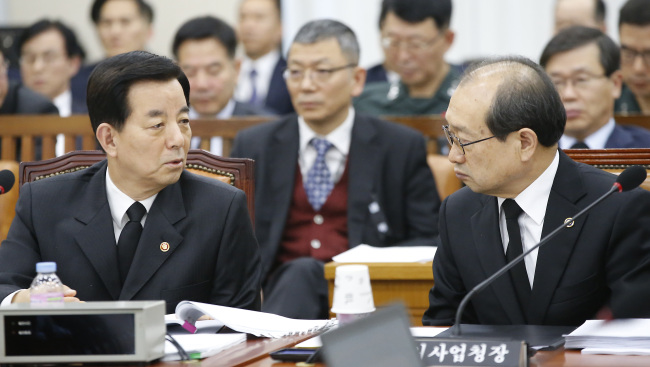South Korea’s project to develop its own fighter jet appears to be facing yet another setback, as some Washington officials are reportedly opposed to a U.S. defense firm’s transfer of technologies to facilitate the project.
 |
| Defense Minister Han Min-koo(left) and Chang Myoung-jin, the head of the Defense Acquisition Program Administration, attend a parliamentary session on Wednesday.(Yonhap) |
Lockheed Martin has agreed to offer the 21 technologies in “broad terms,” but the U.S. State Department demanded that the transfer of specific sub-technologies that form the 21 technologies should be further discussed with Seoul, a Korean government source told The Korea Herald.
The defense firm agreed to transfer the technologies on condition of the U.S. State Department’s endorsement in accordance with the Arms Export Control Act, after it won a 7.3 trillion won ($6.33 billion) contract from Seoul last year to deliver 40 F-35 fighters from 2018 through 2021.
Seoul’s Defense Acquisition Program Administration and Lockheed Martin had planned to secure the U.S. government’s approval by this month.
But further consultations over the technology transfer are expected to be time consuming, observers noted, raising concerns over a potential delay in the KF-X project, which is already a decade behind schedule due to feasibility concerns.
Last week, the two sides held consultations over the issue in Seoul. The second round of talks are to be held next week in Washington.
As part of their bilateral defense technology cooperation, Seoul and Washington have agreed to institute the Defense Technology Strategy and Cooperation Group. When the inaugural session of the DTSCG is held, the two sides are expected to discuss the technology transfer concerning the KF-X project.
Meanwhile, local news reports on Wednesday said the board of directors of Korea Aerospace Industries, the nation’s sole aircraft-maker in charge of the KF-X project, reportedly raised the need to discuss ways to recoup the company’s investment in the project during a session last week.
The project that involves both the development and production of the new fighter is estimated to be worth nearly 20 trillion won ($17.4 billion).
KAI denied that the board of directors had demanded ways to withdraw its investment in the project. It argued that it was the directors’ obligation to discuss and check risks involved in any project, and that the process of contemplating potential risks was part of normal business.
The KF-X project is Korea’s largest-ever defense project to develop an indigenous fighter by 2025 to replace the aging fleet of F4 and F5 fighters. With a budget of 8.5 trillion won, Seoul plans to develop the fighter and spend an additional 10 trillion won to produce 120 KF-X fighters by 2032.
By Song Sang-ho (sshluck@heraldcorp.com)

